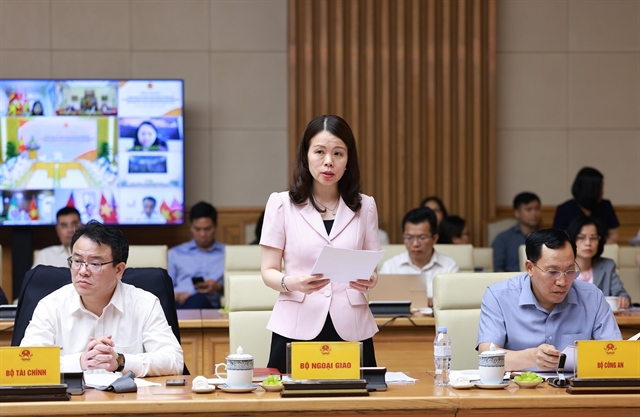 Politics & Law
Politics & Law


|
| Deputy Minister of Foreign Affairs Nguyễn Minh Hằng speaks at the conference on Tuesday. — VNA/VNS Photo |
HÀ NỘI — Deputy Minister of Foreign Affairs Nguyễn Minh Hằng has said that in the first half of 2025, economic diplomacy had been implemented with determination, proactivity and a results-oriented mindset, opening up new avenues and achieving important outcomes.
She made the remarks on July 22 while delivering a report at a conference on advancing economic diplomacy held by the Prime Minister and heads of Vietnamese diplomatic missions abroad.
The report reviewed achievements from the first six months of the year and outlined strategic tasks for the remainder of 2025.
Hằng highlighted the strong integration of economic content into diplomatic activities, particularly at the highest levels. In just six months, Việt Nam conducted nearly 50 high-level external engagements, almost matching the total for all of 2024.
During this period, the nation upgraded relations with 10 countries and signed 253 cooperation agreements, double the figure from last year. These agreements focused primarily on key sectors such as trade, investment and science and technology.
Efforts were also made to reinvigorate traditional growth drivers and to sustain and strengthen partnerships with major economies, especially China, Japan, South Korea, the US, the EU and ASEAN.
High-level exchanges, including with China, Japan and France, helped expand market access and deepen bilateral ties.
The Ministry of Industry and Trade, in coordination with the Ministry of Foreign Affairs and other ministries, advanced negotiations on new free trade agreements with significant potential partners, including MERCOSUR, the Gulf Cooperation Council, the Southern African Customs Union, Brazil, Bangladesh and Egypt.
Diplomatic efforts also focused on addressing market barriers. These included seeking support from EU member states to ratify the EU–Việt Nam Investment Protection Agreement, advocating for the removal of the IUU 'yellow card' and urging the US to recognise Việt Nam as a market economy and remove it from trade monitoring categories D1–D3.
Việt Nam also enhanced its engagement in multilateral forums, contributing substantive input at key platforms such as the World Economic Forum, the UN Ocean Conference, BRICS and the Mekong subregional meetings.
Successfully hosting events like the ASEAN Future Forum and the P4G Summit helped solidify Việt Nam’s international profile and yielded tangible outcomes in economic cooperation.
Despite the positive developments, the deputy minister acknowledged that Việt Nam has not yet fully capitalised on the upgraded diplomatic relationships and favourable political ties to generate breakthroughs.
The implementation of signed agreements remains uneven, and some areas of research, forecasting and policy advising have not kept pace with developments.
For the second half of 2025, economic diplomacy will centre on carrying out Resolution 59 on international integration and ensuring that economic priorities are embedded in high-level foreign affairs activities. This includes reinforcing relations with core partners and expanding ties with emerging ones.
Concrete action plans will be developed, and mechanisms for tracking the implementation of high-level commitments will be established.
Ministries and agencies will be assigned clear responsibilities, and coordinated efforts will be strengthened under the principle of fulfilling all stated commitments. The role of diplomatic task forces will be enhanced to resolve obstacles and address new issues proactively.
Trade efforts will aim to build balanced and sustainable relationships with major partners while diversifying markets, products and supply chains. Việt Nam is also accelerating talks and cooperation frameworks with newly upgraded partners and promising regions, including the Middle East, Eastern Europe, Latin America, Central Asia, Pakistan, Egypt, India and Brazil.
In terms of investment, the country is focused on resolving outstanding issues and attracting strategic projects, with special attention to high-tech sectors. Authorities are also promoting greater participation of domestic enterprises in global production and value chains.
Hằng also stressed the importance of developing new engines for growth. In this regard, science and technology diplomacy, semiconductor diplomacy, and digital economy diplomacy are considered central pillars of modern economic diplomacy.
She said the Ministry of Foreign Affairs will continue enhancing policy research, monitoring global developments and providing timely policy recommendations. It will also intensify information sharing with localities and businesses regarding emerging economic trends, governance rules and international standards. — VNS




